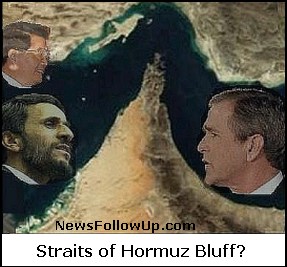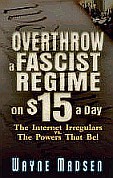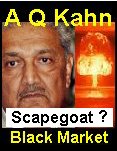| What is special in this ESM-treaty? The Ministers of Finance get a
new part-time function as Governors of the ESM. The national parliaments
have no authority over their Minister of Finance, when the latter acts
as Governors of the ESM. The Governors freely dispose of the State's
Vaults. No veto-right has been foreseen for the national parliaments.
Ratifying this treaty is the death of the sovereign democracies of the
eurozone.
(And if you are not a Parliamentarian, make sure your
Parliamentarians get this message, for otherwise they will give the key
of democracy to the devil without even being aware of it!)
As indicated in the precedent article "ESM, the new European
dictator" , the Ministers of Finance of the 17 euro-countries, on July
11th 2011, have signed a Treaty for the Establishment of the European
Stability Mechanism. Its purpose it to make the citizens pay for the
hundreds of billions of euros that are pumped into the rescue funds to
save the euro and to get the national parliaments in a strangle hold.
The signature was not noticed by the international press. Many
journalists still confuse this new ESM-treaty with its (illegal)
predecessors, the European Financial Stabilisation Mechanism (EFSM) and
the European Financial Stability Facility (EFSF). De EFSF now has a
lending capacity of 440 billion euros. (1.000 billion since 27 October
2011.) The ESM is without limit.
At the moment of writing this treaty still has to be ratified by the
national parliaments in all 17 countries, except if such has already
taken place silently here and there.
For a short introduction in the ESM-treaty you can view this 3.5
minutes video on YouTube:
https://www.youtube.com/watch?v=rxMOW94V6xQ
ESM, a coup d'état in 17 countries!
If by coup d'état we understand a seizure of the real power and a
limitation of the power of the democratically chosen parliament, then
this ESM-treaty is a coup d'état in 17 countries simultaneously.
This is completely in line with the philosophy of the European
Commission, which, according to its President Barroso, must be "the
economic government of the Union, that defines the actions that
governments have to execute." (28 Spetember 2011) [1]
The european Stability Mechanism (ESM) is not that much a mechanism,
but rather a new administration of the European Union (EU). The reported
goal is to supply loans (under strict conditions) to euro-countries,
which cannot fulfil their financial obligations. It takes over the tasks
of the aforementioned EFSF and EFSM. It is ruled by a Board of
Governors. These are the 17 Ministers of Finance of the euro-countries
within the EU.
The ESM treaty says in article 8, that this administration gets a
social capital of 700 billion euros. Then, in article 10 it says that
the Board of Governors may decide to change this amount and adapt
article 8 accordingly. In article 9 it says the Board of Governors may
claim unpaid social capital from the member countries at all times (to
be paid within 7 days.) So in fact it says the ESM can claim money
without limits from the member countries. The treaty does not foresee
any right of veto for the national parliaments.
Unanimous
According to article 5.6 the Board of Governors must take the
decisions above unanimously. So the entire board must vote "yes".
At first glance, it is very curious that the whole treaty stands or
falls with the unanimity of the 17 Ministers of Finance of the
euro-countries. When you see how many difficulties they have to overcome
for an agreement to be reached over freeing up the loans already
promised to Greece, you would not expect that the EU would build a
treaty that starts from the view that this unanimity does exist or at
least can be achieved.
The eurozone is a colourful reflexion of the diversity of Europe: the
Netherlands, Belgium, Luxemburg, Germany and France and also Ireland,
Portugal, Spain, Italy, Malta, Greece, Austria, Slovakia, Slovenia and
finally Estonia and Finland. The 17 Ministers form, in fact, a colourful
company too. Each of them represents a country with different interests.
And they expect unanimity from them? How is that possible?
To understand, we must look a bit further. It is true, in the ESM the
17 ministers vote on all important decisions, but there are still other
people who are present at their meetings, officially as "observers". Wy
would these ministers need observers? To check if they do what they are
expected to do?
There are three observers: the member of the European Commission in
charge of economic and monetary affairs, the President of the Euro Group
(the informal club of the 17 Ministers of Finance) the President of the
European Central Bank! [2] So, if we can't expect these 17 Ministers of
Finance to be unanimous spontaneously, it must be the influence of these
observers that achieves it. To understand which influence the European
Commission and the ECB can exercise on our ministers, let's take a
closer look.
Who are Ministers of Finance?
Well, generally, these are people who come and go. Most of the time
they are appointed after the national parlementarian elections, that are
initially followed by the bargaining of the coalition discussions and
then by the tugging for filling in the most important portfolios, like
the Interior Ministry, Economic Affairs and Finance. In the favorable
case they have the capacities to lead a ministry. Such a person can lead
the Ministry of Defense at one time and be appointed Minister of
Education or Social Affairs some other time. Knowledge of matters is
considered to be less relevant as managing capacities.
Economy is not Finance
This way, at the moment, we have in the Netherlands a Minister of
Finance, Jan Kees de Jager, loaded to the brim with Economic diplomas,
but who initially did not show he had any understanding of finance. One
of his first ideas was to propose a law that should forbid people to
call for a run on the bank. Jan Kees, banks have no money! For each euro
the customers of ING (the biggest Dutch bank) have in their account, the
bank only has 3 cents. You don't expect people to line up for so little?
And furthermore, as long as the central bank does not want a bank to
fall, the latter can easily survive a run on the bank with borrowed
money.
Freshly appointed Ministers of Finance are, generally, extremely
happy they have so much success in their career, but they arrive in a
world they hardly know or don't know at all. That is the self-inportant
little world of international financial institutions and the world of
figures with an endless number of zeros. A little moment of inattention
and you are mistaken by douzens of billions. (That happened to Dutch
Prime Minister Rutte and Jan Kees de Jager when they informed Parliament
after a European meeting about Greece. [3] ) These new ministers are an
easy prey for the counsellors of the ECB and the IMF, who come to
explain how things work and what a good Minister of Finance ought to do.
As far as these Ministers of Finance have a basic knowledge in
economics, they should know that the whole euro-experiment is deemed to
fail. That was already known at the start in 1970, but bankers and
opinionated politicians pushed the shared currency forward. The point is
that a unique currency can only work in a economically homogeneous area.
[4] [5] [6] Here is why.
The prison of the fixed exchange rates
When consumers, in countries with less possibilities for
productivity, prefer cheaper and better products from abroad, the
external debt will increase. At the same time the internal productivity
decreases. A country that has its own currency, can devaluate its
currency then. That makes imported products more expensive for its own
population and makes exported products cheaper for foreign purchasers.
The debt will decrease and the productivity will increase again.
Devaluations were very common before the euro started. The euro works as
a fixed exchange rate. Less productive countries are like rats in a
trap. They will never be able to get out of debts again. That is why,
the chosen method to load still higher debts on these countries is
strange and ill-disposed.
Long live the free capital market!
We should not forget these countries did not have big and
insurmountable problems when they entered the euro-zone. Otherwise, they
would not have been accepted. The problems arose, because with their
admission in the eurozone, the free circulation of capital became a fact
too. Banks from existing euro-countries came on a massive scale to
supply cheap loans to the new euro-citizens. And because, with a same
capital, banks are allowed to lend out twice as much for mortgages than
for other types of loans, they mainly financed housing. However, the
bankers forgot, that people don't need just a roof above their head, but
they also need income to pay back the loans. So the bankers should have
financed sufficient economic activities too. But that did not happen.
This way, a first wave of new euro-citizens became indebted without
possibilities to pay back their debts. The real estate market crashed.
The entrepreneurs and their suppliers went broke, leaving behind a
desolate scene of empty and unfinished housing quarters.
The problematic euro-rules
More over, countries were labelled "problem countries", exclusively
because they could not meet the artificially set demands for the
euro-zone anymore, that is to say a maximum budget deficit of 3% of
their BIP and a maximum debt of 60% of the BIP. [7] Normally, it is not
a problem for a country when the debt is twice as high, when, for
instance, it is counterbalanced by possessions like in Greece. And a
shortage on the budget of over 3% does not need to be a problem for a
country either. In fact, the only problem was, that the set limits for
the euro-zone turned out to be irrealistic and virtually no member
country could meet them. You could also say, that those who had
established these unfeasible exigences were dumbos, as well as the
ministers who promised they would respect them. Anyway, it is a simple
way to create a crisis.
Black sheep
Because nearly all countries had surpassed the set limits, it was
important to divert the attention and point gaudily in the direction of
the naughtiest boy in the classroom. For Greece, these officials even
created a complete defamation campaign, in which lying Dutch politicians
also cheerfully participated. Greece would have hidden its debt [8], and
the Greeks were lazy and retired early etc. [9] Rapidly Greece came
under attack and had to pay ever higher interest for its loans.
Fortunately its euro-class friends wanted to help. Jan Kees even
promised we would earn money on it.
Money is power
Once you have manoeuvered your vicyim into trouble - again, Greece
did not have insurmountable problems when it became member of the
eurozone - you can apply the politics of the carrot and the stick: "We
will supply loans, but under condition that..." The IMF has half a
century of experience with this kind of abuse of power and has applied
this politic mischievously in many developing countries. First the
country is overloaded with loans, so as it isn't even able to pay the
interest. The loans are provided for specific projects. Most often they
are executed by foreign companies. They receive the money from the
loans. The country stays with the debts. Further more everything the
country has of value is sold to foreign investors. And of course the
government has to cut its expenses to the bones and the population must
bleed, so they know the IMF has the power.
Seizure of power of the European Commission
Although, according to article 122.2 of the TFEU [10] the European
Council can offer financial help to countries in difficulties (on
proposal of the European Commission), the wolfs of the European
Commission could not resist the temptation to establish their own IMF,
or more exactly, a European brother, that would closely cooperate with
the IMF.
They got it off the ground in May and June 2010, the EFSM and the
EFSF. They have a temporary character and juridical defaults. The loan
capacity of the EFSF has recently been increased to 1,000 billion euros
(that represents 3,300 per euro-citizen) and its role has been extended
to save the banks too.
Their successor is the ESM. It has been signed on 11 July 2011 and
awaits ratification by the national parliaments. The ESM gets a
permanent character and the power to claim unlimited money from the
States' Vaults and lend it out at cost and risk of the eurocitizens.
They are to start with a social capital of 700 billion (2100 per
euro-citizen), but they are already speaking about an increase to 1.5 to
2 trillion that they think they will need.
Amendment of article 136
The ESM is based on an amendment of article 136 of the TFEU of 23
March 2011 [11], wich, in fact, contains an extension of the competences
of the EU, since this amendment allows for the establishment of
administrations that limit the power of national parliaments. And
because this amendment is based on article 48.6 of the Treaty of Europe,
this is an illegal construction. [12] In Brussels they don't care about
that and, similarly, the national parliaments don't think the
transgression of the democratic rules is that important. For the
consequence would be, that the population would first have to vote about
the extension of competences of Brussels. And that stupid population
would surely vote against it!
The ESM gets the power to empty the States' Vaults without the
Parliaments being able to stop them. Moreover the amendment - strictly
according to its text - enables the establishment of all kinds of
anti-democratic administrations, which under pretext to fight the
instability in the eurozone can limit the effects of national
legislation and can limit civil rights.
Shock and awe
Create a crisis and seize power. At the moment a country is totally
disrupted, you can shape things the way you want. It is a violent
scenario the advocates of the free market economy havave applied for
decades in many countries like England, Poland, China, South-Africa,
Russia and the US. I refer to one of the most reveiling books of our
time: The Shock Doctrine of Naomie Klein (available in many languages, a
must-read.)
Now it is Greece's turn. The defamation has done its work. The
citizens in the other euro-countries hardly protest, and when they do,
it is mainly because of the possible loss of their money, that their
pension funds have invested there. But if they would think a little bit
further, they would understand that they too are manoeuvered into debts
by the rescue funds and can be the next victims tomorrow. That can
happen from one day to the next, announced by a newspaper title like
"ING may fail"...
Vicious circle
In the meantime, in the panic of this manufactured crisis,
parliaments accept urgency measures they did not even consider the day
before. Now, with the money from the urgency funds banks must be saved
too. In the Netherlands they agreed with that on 6 October 2011 (the
Socialist Party voted against it), Slovakia was the last to agree with
the EFSF-expansion on 13 October 2011, after using the issue to dismiss
the government.
So now we have a vicious circle: the banks cause the problems, they
may profit directly and indirectly from the loans of the emergency
measures, and they may lend out still more recklessly, for possible
losses will be paid by the euro-citizens.
Away with unanimous decision making
Back to the ESM. That treaty stands or falls with the unanimity of
the 17 Ministers of Finance. The European Commission and the European
Central bank are confident they have enough influence to get the 17
noses in the same direction.
Well, to be exact, 17 is not really necessary. A decision is also
valid when not all ministers are present. Each minister represents a
number of votes, related to the number of shares his country has in the
ESM. (See annexe below this article.) When 2/3 of the ministers with 2/3
of the votes are present, a ballot can be held validly. And when
ministers who are present for the vote, don't vote, that still counts as
a unanimous decision. As long as nobody actually votes against it.
In theory, a hard headed minister of a small country could block the
whole proces. (He must be very daring.) Barroso does not want that
anymore. He wants all the European Treaties to be changed in order to
abolish the unanimous decision making process. For the ESM that would
mean that if Germany, France, Italy and a smaller country like the
Netherlands agree with each other, the 13 other countries have nothing
more to say. Long live the dictatorship in Brussels! Long live the EU!
Inviolability
We are already used to the fact that administrators and
representatives of the people do not want to answer for their words and
deeds. But at the ESM they exaggerate this to the extreme. The rules are
set in a way, that everyone who works there can do or not do anything he
likes, without having to answer for it to parliaments, administrations
or judges! At the utmost a Minsiter of Finance can be replaced by
another, who will immediately enjoy the same excessive privileges. A
criminal could not wish a better den.
A final thought
The European Union has the free market economy as laid down
principle. Meanwhile, almost everybody has understood that deregulation
of banks, privatizations of infrastructures and the abolition of
governmental functions lead to a harsh society, plagued by crises. These
principles are outdated. The advocates of these principles will only be
able to push them forward with violence. Greece won't be the last
victime.
Annexe
Repartition of the votes among the Governors of the ESM according to
the numbers of shares the member coountries detain.
Subscriptions to the authorised capital stock
ESM Member
Number of shares
Capital subscription (EUR)
Kingdom of Belgium 243 397
24 339 700 000
Federal Republic of Germany 1 900 248
190 024 800 000
Republic of Estonia 13 020
1 302 000 000
Ireland 111 454
11 145 400 000
Hellenic Republic 197 169
19 716 900 000
Kingdom of Spain 833 259
83 325 900 000
French Republic 1 427 013
142 701 300 000
Italian Republic 1 253 959
125 395 900 000
Republic of Cyprus 13 734
1 373 400 000
Grand Duchy of Luxembourg 17 528
1 752 800 000
Malta 5 117
511 700 000
Kingdom of the Netherlands 400 190
40 019 000 000
Republic of Austria 194 838
19 483 800 000
Portuguese Republic 175 644
17 564 400 000
Republic of Slovenia 29 932
2 993 200 000
Slovak Republic 57 680
5 768 000 000
Republic of Finland 125 818
12 581 800 000
Total 7 000 000
700 000 000 000
Sources and references
[1] Barroso, 28 September 2011 http://euobserver.com/19/113760
[2] Officially, the European Central bank is not an organ of the
European Union.* The ECB is the property of the central banks of the
euro-countries. In turn, they are independent from the national
governments in the sense that they do not take orders from them. They
are ruled by a board of private persons. So the euro does not belong to
the EU, neither to the national governments, but to a cartel of private
bankers, the ECB in Franckfurt, the town of the Rothschild. The EU
cannot give any order to the ECB, but inversily the ECB has power within
the EU. It governs the European System of Central Banks (ESCB), which is
an EU organ. The ECB, together with the central banks of the eurozone,
are the members of this ESCB. How complicated do they have to make it to
integrate a private company as an official organ with the power of an
official organ?
*
http://www.europarl.europa.eu/parliament/expert/displayFtu.do?id=73&ftuId=FTU_5.2.html&language=en
[3] Vrijspreker 22 July 2011 *
The Dutch government and the European Commission contradict each
other about the size of the new support package for Greece. According to
the Ministry of Finance the amount is 109 billion euros, of which 50
billion will come from the banks and other financial institutions.
According to the European Commission the governments contribute 109
billion euros and on top of it 50 billion will come from private
institutions. The Dutch central bank doesn't know: "We too, we are very
curious to know what has been decided", a spokesman of the DNB says. The
European Central Bank refers to the European Commission.
*
http://www.vrijspreker.nl/wp/2011/07/eu-euro-reddingsactie-geklungel/
[4] In the studies about optimum currency areas we can distinguish
those focusing on the needed conditions and those from after 1970 (when
politicians had decided they wanted a single currency in Europe)
focusing on cost and benefits.
Roman Horvath and Lubos Komarek in “OPTIMUM CURRENCY AREA THEORY: AN
APPROACH FOR THINKING ABOUT MONETARY INTEGRATION” (2002)
“It is possible to distinguish two major streams of the optimum
currency area literature. The first stream tries to find the crucial
economic characteristics to determine where the (illusionary) borders
for exchange rates should be drawn (1960s-1970s). The second stream
(1970s-till now) assumes that any single country fulfills completely the
requirements to make it an optimal member of a monetary union. As a
result, the second approach does not continue in the search for
characteristics, identified as important for choosing the participants
in an optimum currency area. This literature focuses on studying the
costs and the benefits to a country intending to participate in a
currency area.”
http://wrap.warwick.ac.uk/1539/1/WRAP_Horvath_twerp647.pdf , page 7.
Friedman put forward the advantages of flexible exchange rates
between countries as follows: As it is commonly observed, the country’s
prices and wages are relatively rigid and factors are immobile among the
countries. As a result, under the negative demand or supply shock the
only instrument to avoid higher inflation or unemployment is the change
in the flexible exchange rate (that means appreciation or depreciation
of the currency). This brings the economy back to the initial external
and internal equilibrium. (...) Under the fixed exchange rate regime
there would always be the unpleasant impact on unemployment or
inflation.
http://wrap.warwick.ac.uk/1539/1/WRAP_Horvath_twerp647.pdf , page 8.
[5] Yrd. Doç. Dr. Hüseyin Mualla YÜCEOL, Mersin Üniversitesi İktisadi
ve İdari Bilimler Fakültesi, Maliye Bölümü, in “WHY THE EUROPEAN UNION
IS NOT AN OPTIMAL CURRENCY AREA: THE LIMITS OF INTEGRATION”
Europe is not an optimal currency area. Although, On January 1, 1999,
11 EU countries initiated an EMU by adopting common currency, the euro,
the EU does not appear to satisfy all of the criteria for an optimum
currency area. Then, joining the EU is not identical with joining the
euro for both old members and new members.
http://eab.ege.edu.tr/pdf/6_2/C6-S2-M6.pdf , page 66
[6] Paul de Grauwe, excerpts of speech
“With up to twenty-seven members instead of the present twelve, the
challenge for ensuring a smooth functioning of the enlarged Eurozone
will be daunting. The reason is that in such a large group the
probability of what economists call ‘asymmetric shocks’ will increase
significantly. This means that some countries may experience a boom and
inflationary pressures while others experience deflationary forces. If
too many asymmetric shocks occur, the ECB will be paralyzed, not knowing
whether to increase or to reduce the interest rates. As a result, member
countries will often feel frustrated with the ECB policies that do not
(and cannot) take into account the different economic conditions of the
individual member countries. This leads us to the question whether the
enlarged EMU will, in fact, be an optimal currency area.” (...)
“If a country is hit by negative shocks brought about by
agglomeration effects, the wage cuts necessary to deal with these shocks
will inevitably be very large. To give an example: If Ford Motor were to
close down a plant in Belgium and to invest in Poland instead, the wage
cut of Belgian workers that would convince Ford Motor not to make this
move would have to be 50% or more given that the wage not feasible, then
flexibility dictates that the Belgian workers be willing to move.”
http://mostlyeconomics.wordpress.com/2010/06/21/were-europes-curent-problems-never-imagined/
[7] These are the requirements of the Stability and Growth Pact.
[8] Nikolaos Salavrakos, Member of the European Parliament in "Is
there a way out?"
http://www.efdgroup.eu/news/99-the-greek-fiscal-crisis-is-there-a-way-out.html
[9] OECD statistics
http://www.oecd.org/document/47/0,3343,en_2649_34747_39371887_1_1_1_1,00.html
[10] Article 122.2 of the Treaty on the Functioning odf the European
Union:
"Where a Member State is in difficulties or is seriously threatened
with severe difficulties caused by natural disasters or exceptional
occurrences beyond its control, the Council, on a proposal from the
Commission, may grant, under certain conditions, Union financial
assistance to the Member State concerned. (...)"
[11] European Parliament resolution of 23 March 2011 on the draft
European Council decision amending Article 136 of the Treaty on the
Functioning of the European Union
http://www.europarl.europa.eu/sides/getDoc.do?pubRef=-//EP//TEXT+TA+P7-TA-2011-0103+0+DOC+XML+V0//EN
[12] art 48.6 Treaty of the European Union
eur-lex.europa.eu
TREATY ESTABLISHING THE EUROPEAN STABILITYMECHANISM (ESM) http://consilium.europa.eu/media/1216793/esm%20treaty%20en.pdf
If you don't want to miss the next publication, then click here:
I would like to receive an email as soon as another article appears
in English.
Please note that SPAMFIGHTER often sees my messages as SPAM.
SPAMFIGHTER as political weapon? No, it is just the consequence of badly
conceived principles of the program. If you subscribe to stay informed,
please check your spamfolder regularly. And when you find messages from
me there, please click UNBLOCK. I thank you very much in advance. - Rudo
de Ruijter
|





 Conservative
Republicans, Bush has killed the Republican brand name
Conservative
Republicans, Bush has killed the Republican brand name





